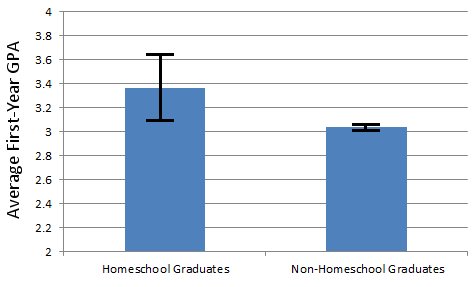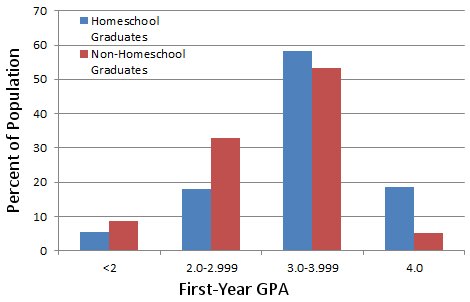I was recently made aware of a 2010 analysis that was done by Baylor University’s Office of Institutional Research and Testing. It compared first-time Baylor freshman who were homeschool graduates to the rest of Baylor’s first-time freshman population over a period of four years. I think the results will be helpful to those who are wondering whether or not home education adequately prepares a student for the academic rigors of university.
The first thing the analysis noted was that homeschool graduates had significantly higher SAT and ACT scores than the rest of the population. The homeschool graduates, for example, averaged 115 points higher on the SAT than the rest of the student population. While that is interesting, the really important result is how the homeschool graduates performed in their freshman year at Baylor. In the end, the average homeschool graduate had a freshman grade point average (GPA) of 3.364, while the average for the rest of the freshman class was 3.038. Here is a bar graph that illustrates this result:

The black bars on the graph are called error bars, and they demonstrate the possible error that exists in such a measurement. When you study a group of people, it is always possible that the people you have studied are not quite representative of the population you are trying to understand. As a result, whatever you measure might not be an accurate measurement of the population in general. Using statistics, it is helpful to estimate how much your measurement might be in error. The crudest way to do that is to use the size of the sample you are studying as a guide. The more people you study, the more accurate your representation of the population should be. In this analysis, they had a huge population of non-homeschool graduates (14,078) but a small population of homeschool graduates (151). As a result, the error associated with the homeschool graduates is large, while the error associated with the non-homeschool graduates is small.*
In general, the way you treat error bars is to assume that the measurement can actually be anywhere within the range of the error bar. For the homeschool graduates, then, the measured average was 3.364. However, based on the error bar, it could actually be anywhere from 3.090 to 3.638. For the non-homeschool graduates, the measured average was 3.038, but it could actually be anywhere from 3.012 to 3.064. The important thing to note is that even if you take the lowest value for the homeschool graduates and the highest value for the non-homeschool graduates, the average for the homeschool graduates is still higher. This means the analysis provides strong evidence that the average homeschool graduate does better than the rest of the population during his or her freshman year at Baylor. While I find that interesting, I think a more detailed look at the data is even more interesting.
Instead of looking at the averages, let’s look at the distribution of GPAs in each population. Here is what the report shows:

In the graph, the blue bars represent the homeschool graduates, while the red bars represent the non-homeschool graduates. Notice that for GPAs under 2 (below a “C”), there are more non-homeschool graduates than homeschool graduates. This is also true for GPAs between 2.0 and 2.999 (“C” to “C+”). However, there are more homeschool graduates between 3.0 to 3.9999 (“B” to “B+”), and significantly more homeschool graduates with 4.0’s (which means they got straight “A’s” their freshman year).
So what does this indicate? It indicates that at Baylor University, the homeschool graduates are the better freshman students. They not only have a higher freshman GPA, but they are also significantly more likely than the rest of the population to get straight A’s their freshman year. Now…does this mean that homeschool graduates are more successful at all universities? Not necessarily. It might mean that Baylor is better at finding homeschool graduates who will be successful than it is at finding non-homeschool graduates who will be successful. However, I find that unlikely. Also, when you combine these results with other studies that indicate homeschool graduates are more successful at university than the rest of the population, I think that the most reasonable conclusion is that homeschooling provides the best preparation for university.
That has always been my expectation, given my experience with homeschool graduates and homeschooled students. It is nice to see that the data are confirming my expectation.
* Please note that the analysis itself did not include the error bars. I calculated the error bars given the sample sizes that were reported in the analysis.
Return to Text

What if someone were to argue that homeschoolers do better due to being predominantly drawn from demographic groups which tend to have higher academic performance? I’ve seen various studies showing better performance by homeschoolers, but the studies I’ve seen have never seemed to really consider the demographic question as much as I’d like.
Winston, there are studies that have addressed that question. For example, Ray’s 1997 study, Home Education Across the United States, had a section that showed the academic achievement of homeschooled students is not affected much by the parents’ education level. Another study of his in 2009 showed essentially the same thing.
Thanks. That really answered my question!
It’s nice to see my anecdotal evidence from being a homeschool graduate college student who knows a few homeschoolers at college being supported by an actual study. Are there any studies that show if higher GPAs on average are maintained throughout the entire college career?
(As a side note the anecdotal evidence I mentioned earlier is that of the homeschoolers I know at my school who are senior chemistry or combined chem/bio majors we all have GPAs that range from 3.7 to 3.995.) As another side note, I find it interesting too that the top students in many of my science classes have been devout Christians, and I go to a decidedly non-Christian public university. And “they” say Christianity and science are diametrically opposed…
Thanks for your anecdotal evidence, Vivielle. When “they” say Christianity and science are diametrically opposed, “they” are only demonstrating their ignorance of both.
In answer to your question, there is at least one study that indicates homeschool graduates maintain their higher-than-average GPAs throughout their college experience. A study done at the University of St. Thomas shows that while the gap between the rest of the population and homeschool graduates diminishes a bit over time, even in their fourth year, homeschool graduates maintain a higher GPA.